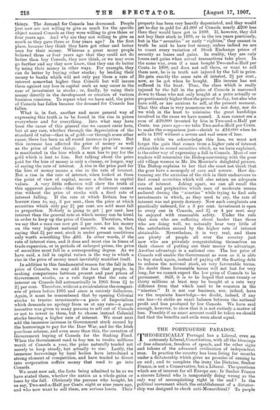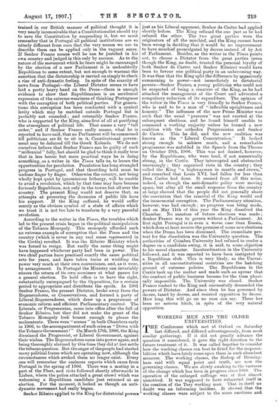THE PORTUGUESE PARADOX.
THEORETICALLY Portugal has a Liberal, even an extremely Liberal, Constitution, with all the blessings of free education, freedom of speech,.and the other signs and tokens of the advanced civilisation of independent man. In practice the country has been living for months under a dictatorship which gives no promise of coming to an end ; and to complete the irony the Dictator, Senhor Franco, is not a Conservative, but a Liberal. The questions which are of interest for all Europe are: Is Senhor Franco a sincere Liberal who is temporarily doing wrong as the only way of accomplishing right in the end ? Is the political movement which the establishment of a dictator- ship was designed to check anti-Monarchical ? To people trained in our British manner of political thought it is very nearly inconceivable that a Constitutionalist should try to save the Constitution by suspending it, but we must remember that in Portugal all political institutions are so utterly different from ours that the very names we use to describe them can be applied only in the vaguest sense. If Senhor Franco means well he can be justified in his own country and judged in this only by success. As to the nature of the movement which he fears might be encouraged by the election of a new Parliament it is undoubtedly Republican to some extent, but not enough to warrant the assertion that the dictatorship is carried on simply to check a rise of anti-dynastic feeling. In spite of the scarcity of news from Portugal—the Liberal Dictator seems to have laid a pretty heavy hand on the Press—there is enough evidence to show that Republicanism is an accidental expression of the extreme weariness of thinking Portuguese with the corruption of both political parties. For genera- tions this corruption has been conducted with a cynical levity which may be matched outside Portugal but is probably not exceeded ; and ostensibly Senhor Franco, who is supported by the King, aims first of all at purifying the atmosphere of political life. That seems a very " tall order," and if Senhor Franco really means, what he is reported to have said, that no Parliament will be summoned. till politicians are fit to sit in it, Constitutional govern- ment may be deferred till the Greek Kalends. We do not ourselves believe that Senhor Franco can be guilty of such "millennial " folly, but should be glad to think it really true that in less heroic but more practical ways be is doing something, as a writer in the Times tells us, to lessen the opportunities for peculation. Peculation has long strangled progress in Portugal, and that throttling hold must be undone finger by finger. Otherwise the country, not being wholly kept quiet by ignominious lethargy, will be unable to avoid a revolution, which by that time may have become furiously Republican, not only in the towns but all over the country. The present King would not deserve that, as attempts at procuring the decencies of public life have his support. If the King suffered, he would suffer merely as the obvious symbol of a state of affairs which we trust it is not too late to trauform by a very peaceful revolution.
According to the writer in the Times, the troubles which led to the present crisis began in the political manipulation of the Tobacco Monopoly. This monopoly afforded such an extreme example of corruption that the Press and the country (which is never in any real sense represented in the Cortes) revolted. It was the Ribeiro Ministry which was forced to resign. But really the same thing might have happened whichever party had been iu power. The two chief parties have practised exactly the same political arts for years, and have taken turns at wielding the power very much at their own convenience, and, as it were, by arrangement. In Portugal the Ministry can invariably ensure the return of its own nominees at what passes for a general election. To hold office is to have the right, substantially unimpugned by the Opposition, for a certain period to appropriate and distribute the spoils, In 1901 Senhor Franco, the present Dictator, broke away from the Regeneradores, or Conservatives, and formed a party of Liberal-Regeneradores, which drew up a programme of economic reform and efficient Parliamentary control. The Liberals, or Progressistas, came into office after the fall of Senhor Ribeiro, but they did not make the grant of the Tobacco Monopoly look honest enough to please the malcontents. There were " scenes " in both Chambers early in 1906, to the accompaniment of such cries as " Down with the Tobacco Government ! " On March 17th, 1906; the King dismissed the Progressist, or Liberal Government, against their wishes. The Regeuemdores came into power again, and being thoroughly alarmed by this time they did at last settle the tobacco question. But the anger of thepeople had started many political forces which are operating now, although the circumstances which evoked them no longer exist. Every one will remember the ominous reports which came from Portugal in the spring of 1906. There was a mutiny in a part of the Fleet, and riots followed shortly afterwards in Lisbon, where the police attacked a great crowd which was welcoming a Republican candidate just returned at an election. For the moment, it looked as though an anti- dynastic movement had really begun.
Senhor Ribeiro applied to the King for dictatorial powers just as his Liberal opponent, Senhor de Castro had applied shortly before. The King refused the one just as he had refused the other. The two great parties were the originators of all the mischief, and the King cannot have been wrong in deciding that it would be no improvement to have mischief promulgated by decree instead of by Act of Parliament. Besides, as the writer in the Times points out, to choose a Dictator from the great parties (even though the King, no doubt, trusted the personal loyalty of both Senhor de Castro and Senhor Ribeiro) would have been to favour one political party in an unbecoming way. It was then that the King split the difference by snaciously summoning to power—not immediately to dictatorial powers—Senhor Franco, a young politician who could not be suspected of being a creature of the King, as he had attacked the management of the Court and advocated a compulsory reduction of its expenditure. The opinion of the writer in the Times is very friendly to Senhor Franco, who is said to be a man of " inflexible uprightness and honesty." The influence of the new Prime Minister was such that the usual " pressure " was not exerted at the subsequent elections, and he found himself unable to command a working majority unless he formed a new coalition with the orthodox Progressistas and Senhor de Castro. This he did, and the new coalition was known as the " Liberal Concentration." It looked strong enough to achieve much, and a remarkable programme was unfolded in the Speech from the Throne on October 29th, 1906. This was not desired, however, by the Republicans, who were loud, if not numerically strong, in the Cortes. They interrupted and obstructed unceasingly ; they organised riots in the country ; they called the King "a highwayman in mantle and crown," and remarked that Louis XVI. had fallen for less than Dom Carlos had done. It seemed from all this noise, indeed, as though the anti-dynastic policy were moving apace, but after all the small response from the country at large showed that the people did not generally share the conviction that the removal of the King would end the immemorial corruption. The Parliamentary situation, however, was bad enough ; no progress was being made, and on May 11th of this year the King dissolved the Chamber. No mention of future elections was made ; Senhor Franco was to govern without a, Parliament. At first sight Portugal is in even a worse case than Russia, which does at least receive the promise of some new elections when the Puma has been dismissed. The immediate pre- text for the dissolution was the University question. The authorities of Coimbra University had refused to confer a degree on a candidate owing, it is said, to some objection to his moral character. Insubordination in the University followed, and it was reported to have been instigated by a Republican club. This is very likely, as the Univer- sities in all unconstitutional countries are the hatching ground of extreme policies. The Republicans in the Cortes took up the matter and made such an uproar that the conduct of public business became for the time physi- cally impossible. The University was closed. Senhor Franco rushed to the King and successfully demanded the powers of Dictator. And since then he has governed by decree, taxed by decree, and resisted opposition by decree. How long this will go on no man can say. There has been no serious hitch, in spite of the very natural opposition.



































 Previous page
Previous page